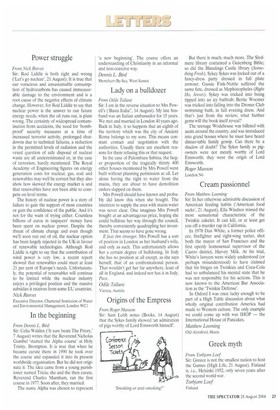Power struggle
From Nick Reeves Sir: Rod Liddle is both right and wrong (Tees go nuclear', 21 August). It is true that our voracious and unsustainable consumption of hydrocarbons has caused immeasurable damage to the environment and is a root cause of the negative effects of climate change. However, for Rod Liddle to say that nuclear power is the answer to our future energy needs, when the oil runs out, is plain wrong. The certainty of widespread contamination from accidents, the need for 'bombproof security measures at a time of increased terrorist activity, prolonged shutdowns due to technical failures, a reduction in the permitted levels of radiation and the vexed question of safe disposal of nuclear waste are all underestimated or, in the case of terrorism, hardly mentioned. The Royal Academy of Engineering figures on energy generation costs for nuclear, gas, coal and renewables may well be correct but they also show how skewed the energy market is and that renewables have not been able to compete on level terms.
The history of nuclear power is a story of failure to gain the support of most countries or gain the confidence of the public. And it's not for the want of trying either. Countless billions of euros in taxpayers' money have been spent on nuclear power. Despite the threat of climate change and even though we'll soon run out of oil, the nuclear option has been largely rejected in the UK in favour of renewable technologies. Although Rod Liddle is right to say that the contribution of wind power is very low, a recent report showed that renewables could meet at least 21 per cent of Europe's needs. Unfortunately, the potential of renewables will continue to be limited while the nuclear industry enjoys a privileged position and the massive subsidies it receives from some EU countries.
Nick Reeves
Executive Director, Chartered Institution of Water and Environmental Management, London WC1


























































 Previous page
Previous page